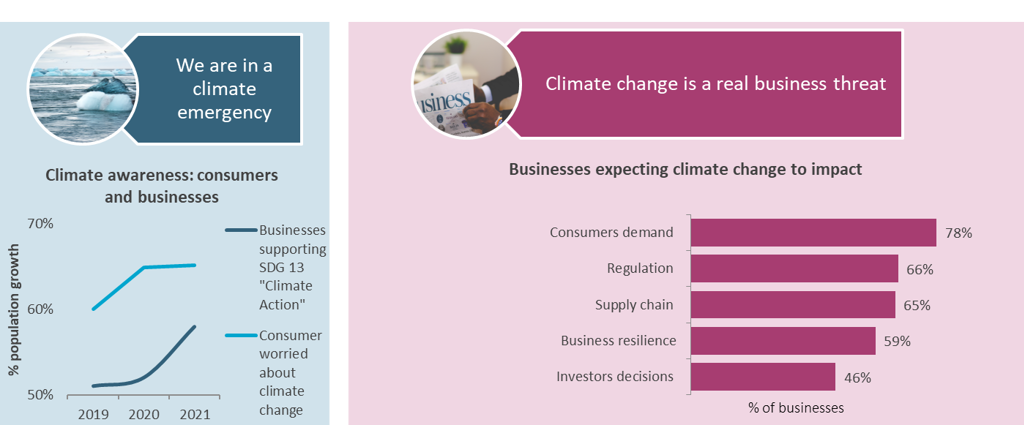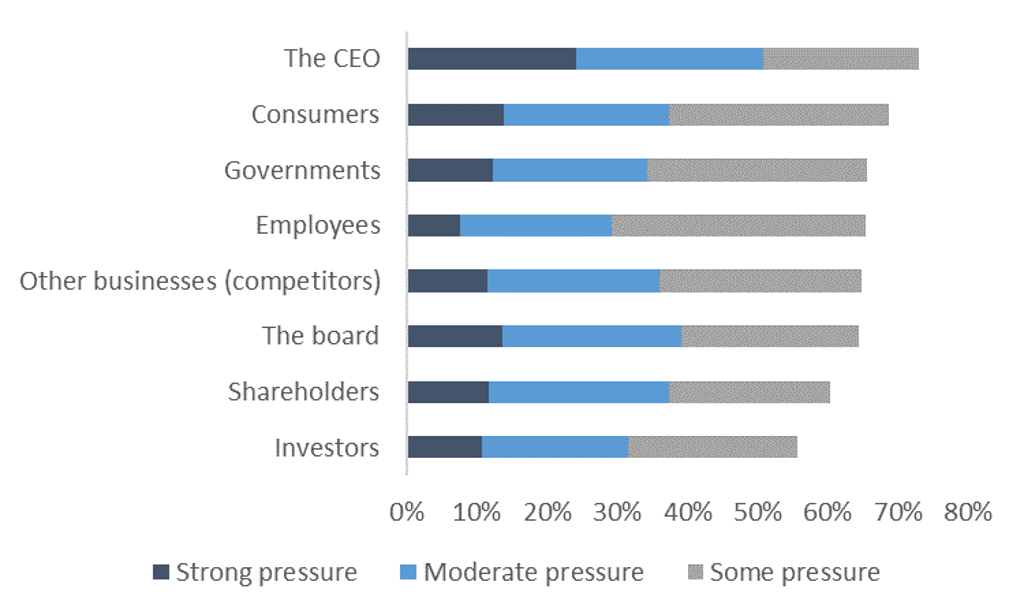According to the World Economic Forum, extreme weather and climate action failure are not only the two most likely to happen long-term risks, but they are among the top five most impactful global risks. In 2021, climate action failure ranks second only after the risk of infectious diseases, such as a pandemic.
Climate action: Why now?
Consumers are increasingly worried about the impact of climate change and this eco-anxiety is driving demand for more sustainable products and services. Investors are moving away from assets that will be at high risk due to climate change and governments around the globe are declaring a state of climate emergency.
Source: Euromonitor International from Voice of the Consumer Lifestyles Survey 2021 (fielded in Jan-Feb 2021) and Voice of the Industry Sustainability Survey 2021 (fielded in May 2021)
However, businesses have been slow to react and address climate impacts, with only half of them engaging with the Sustainable Development Goal “Climate Action” (SDG 13), according to the Voice of the Industry Sustainability survey 2021. Luckily this is changing with pressure to act coming from those at the top of the businesses.
Who puts pressure on climate action?
Sustainability has made its way up to the boardroom. Boards of directors are making the connection between sustainability and financial performance with over a third of companies now seeing financial value in investing in sustainability.
Level of pressure for climate action
Source: Euromonitor International from Voice of Industry Sustainability Survey 2021 (fielded in May 2021)
CEOs are becoming public facing activists taking the lead to openly talk about social and environmental issues and explaining the role that the business is playing in fighting the climate crisis. According to Euromonitor’s Voice of the Industry Sustainability Survey, almost half of companies communicate sustainability through the CEO’s voice and over a quarter of professionals claim to work for a company whose CEO is a sustainability activist.
In June this year, 70 CEOS of companies including H&M, IKEA, Unilever and Nestlé, and investors worth USD41 trillion, signed a letter demanding bolder climate action, which according to the Global Commission on the Economy and Climate could deliver at least USD26 trillion through 2030 compared with if no action was taken.
With increasing pressure to disclose and minimise their impact on the climate, businesses across all industries are embracing low-carbon strategies to reduce their emissions.
In April 2021, global consumer goods manufacturer Unilever launched a new OMO (Persil) laundry capsule detergent in China, made from industrial carbon emissions obtained via carbon capture technology. This initiative is part of its USD1.2 billion Clean Future strategy, in which the company seeks to eliminate fossil fuels in its product manufacturing processes by 2030.
With almost half of Unilever’s carbon footprint coming from chemicals used in cleaning and laundry products, transitioning away from fossil fuel-derived chemicals in product formulations is expected to reduce the carbon footprint of its product manufacturing by 20%.
In June 2021, IKEA announced a new renewable energy programme for suppliers. The programme will accelerate the transition to renewable energy of 1,600 of its direct factory suppliers in India, China and Poland. This movement shows bold leadership from the private sector in the fight against climate change. Reaching the company’s ambitious goal of becoming climate positive requires a high level of collaboration with suppliers.
Companies cannot make the necessary changes if they act in isolation. Helping and engaging suppliers, de-risking investment in renewable energy projects, and bringing down technology costs are all fundamental steps towards meeting the ambitious emissions goals outlined in the Paris Agreement.
Climate change is a very real risk for businesses, affecting everything from productivity, resilience, and legislation, to consumer demand and investors’ decisions. As a result, companies are now ramping up climate action to help the world shift to a low-carbon economy.
This creates innovation opportunities in areas as diverse as renewable energy, electric last-mile deliveries and green finance to climate-friendly diets, low-carbon lifestyles and net-zero emissions business models. Although the hottest investments are related to energy efficiency and the shift to renewable energies, other key areas are education and behavioural change campaigns alongside low carbon product innovation. Climate investment priorities, however, vary by industry.
If you want to find out more about this topic please have a look at our report From Sustainability to Purpose: Climate Action.


